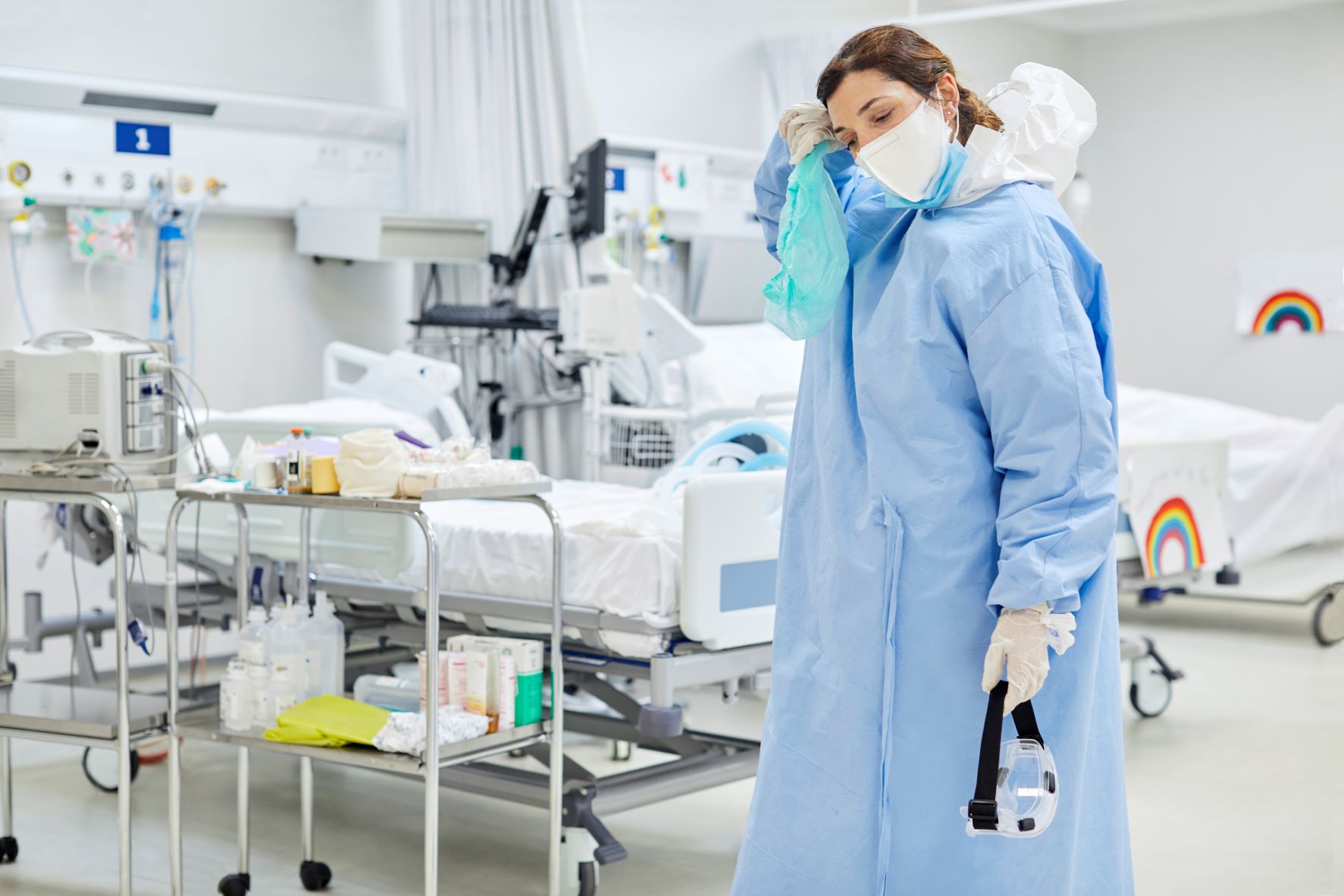 Many labor and delivery nurses are still impacted by the stress from the early days of the COVID-19 the pandemic, find DePaul researchers. (iStock.com/Morsa Images)
Many labor and delivery nurses are still impacted by the stress from the early days of the COVID-19 the pandemic, find DePaul researchers. (iStock.com/Morsa Images) CHICAGO — Delivering an infant during the early days of the COVID-19 pandemic was traumatic for many new parents. Researchers at the DePaul University School of Nursing found that medical protocols instituted at the outset of the pandemic in labor and delivery wards also had adverse effects on the wellbeing of nurses. Three years later, many nurses are still impacted from those dark days of the pandemic, said lead researcher Shannon Simonovich, associate professor of nursing at DePaul.
“Workplaces need to take care of their nurses,” Simonovich said. “Hospitals and other employers that prioritize nurses are also helping to optimize community health outcomes.” The study was published in the Journal of Obstetric, Gynecologic, & Neonatal Nursing.
At the start of the COVID-19 pandemic, many hospitals implemented policies for labor and delivery care that required nurses to separate newborns from COVID-19-positive mothers at the moment of birth, denying the mother and infant the vital bonding that takes place in those first minutes and hours after delivery. The study found that there were inconsistencies in the implementations of these policies and created emotional challenges for nurses who had to carry them out, often in highly stressful environments.
As part of a larger study of 100 nurses, researchers interviewed 19 labor and delivery nurses and certified-nurse midwives who cared for COVID-19-positive mothers giving birth during the time of the pandemic. The interviews revealed lapses in standards of patient care, and the psychological stress that the nurses endured.
While the decisions to separate mothers from newborns to reduce COVID-19 transmission risk were well intended, Simonovich and her colleagues found troubling ramifications that included vicarious trauma endured by health care workers. Sometimes, mothers were unaware they were positive for COVID-19 until tested at the hospital, causing confusion and distress. In another instance, a mother had been informed that since she was COVID-19 positive, her baby would be separated from her right after she delivered. The physician, though, reached to put the newborn on the mother’s stomach, and realizing his mistake, removed the infant. “That mom shrieked so loudly that it was a shriek of pain, a pain of loss,” recounted a delivery nurse.
The fear reported among nurses was that moments like these and the separation of mothers and newborns would cause lasting negative effects for the mother and child. “The most critical finding of our study is related to the isolation during active labor from their support system and providers. Nurses in the study consistently described frustration about these policies and worry for their patients,” said co-author Lucy Mueller Wiesemann, a School of Nursing alumna and former faculty member. “All of the nurses who participated in the study described anxiety symptoms from caring for patients during the first wave of COVID-19.”
A source of the problem is that these initiatives came from decisions made from the highest levels of medical institutions, without input from nurses working on the front lines during the pandemic, said Simonovich. “It’s very common in healthcare that C-suite executives might roll out policies that are meant to safeguard the institution, but don’t have shared decision making in place where nurses and certified nurse midwives who are at the bedside caring for the populations have a voice.”
Nichelle Bush, from the DePaul School of Nursing faculty, and María Piñeros-Leaño, of Boston College, were also contributors to the study. Maternity patients from marginalized communities suffered disproportionally during the pandemic. “COVID revealed what we already knew: There are huge disparities still amongst marginalized communities,” Bush said. “It’s time for legislators and governmental officials to take action, and put funding and programming in place to better prioritize the health of patients in this population.”
Researchers propose policy changes that would improve emotional and mental health support for labor and delivery nurses and certified-nurse midwives. “Nurses are the most trusted health care providers in our health care system,” said Mueller Wiesemann. “Addressing nurses and the rest of the health care workforce as whole human beings and putting resources in place to help them to be healthier both physically and emotionally will help them to be the best that they can be in their roles.”
###
Sources:
Shannon Simonovich
s.d.simonovich@depaul.edu
Lucy Mueller Wiesemann
lmuelle8@depaul.edu
Nichelle Bush
nbush3@depaul.edu
Media Contact:
Kristin Claes Mathews
kristin.mathews@depaul.edu